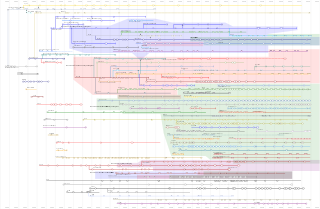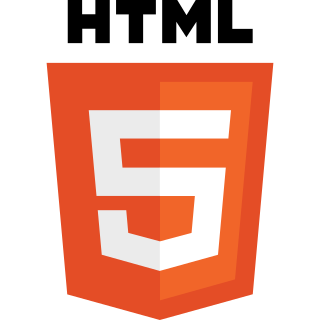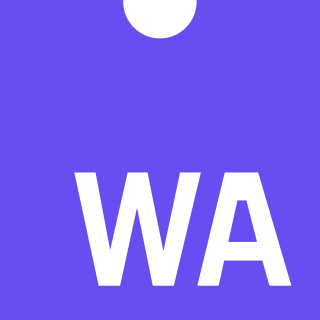Gecko is a browser engine developed by Mozilla. It is used in the Firefox browser, the Thunderbird email client, and many other projects.

A browser war is a competition for dominance in the usage share of web browsers. The "first browser war," (1995–2001) pitted Microsoft's Internet Explorer against Netscape's Navigator. Browser wars continued with the decline of Internet Explorer's market share and the popularity of other browsers including Firefox, Google Chrome, Safari, Microsoft Edge and Opera.
Trident is a proprietary browser engine for the Microsoft Windows version of Internet Explorer, developed by Microsoft.

HTTP pipelining is a feature of HTTP/1.1, which allows multiple HTTP requests to be sent over a single TCP connection without waiting for the corresponding responses. HTTP/1.1 requires servers to respond to pipelined requests correctly, with non-pipelined but valid responses even if server does not support HTTP pipelining. Despite this requirement, many legacy HTTP/1.1 servers do not support pipelining correctly, forcing most HTTP clients to not use HTTP pipelining.
Netscape Plugin Application Programming Interface (NPAPI) is a deprecated application programming interface (API) for web browser plugins, initially developed for Netscape Navigator 2.0 in 1995 and subsequently adopted by other browsers.
Add-on is the Mozilla term for software modules that can be added to the Firefox web browser and related applications. Mozilla hosts them on its official add-on website.
A browser extension is a software module for customizing a web browser. Browsers typically allow users to install a variety of extensions, including user interface modifications, cookie management, ad blocking, and the custom scripting and styling of web pages.
MDN Web Docs, previously Mozilla Developer Network and formerly Mozilla Developer Center, is a documentation repository and learning resource for web developers. It was started by Mozilla in 2005 as a unified place for documentation about open web standards, Mozilla's own projects, and developer guides.
Tamarin is a discontinued free software virtual machine with just-in-time compilation (JIT) support intended to implement the 4th edition of the ECMAScript (ES4) language standard. Tamarin source code originates from ActionScript Virtual Machine 2 (AVM2) developed by Adobe Systems, as introduced within Adobe Flash Player 9, which implements ActionScript 3 scripting language. ActionScript Virtual Machine 2 was donated as open-source to Mozilla Foundation on November 7, 2006, to develop Tamarin as a high-performance virtual machine, with the support from broad Mozilla community, to be used by Mozilla and Adobe Systems in the next generation of their JavaScript and ActionScript engines with the ultimate aim to unify the scripting languages across web browsers and Adobe Flash platform and ease the development of better performing rich web applications.

HTML5 is a markup language used for structuring and presenting hypertext documents on the World Wide Web. It was the fifth and final major HTML version that is now a retired World Wide Web Consortium (W3C) recommendation. The current specification is known as the HTML Living Standard. It is maintained by the Web Hypertext Application Technology Working Group (WHATWG), a consortium of the major browser vendors.

Web development tools allow web developers to test, modify and debug their websites. They are different from website builders and integrated development environments (IDEs) in that they do not assist in the direct creation of a webpage, rather they are tools used for testing the user interface of a website or web application.
The Indexed Database API is a JavaScript application programming interface (API) provided by web browsers for managing a NoSQL database of objects. It is a standard maintained by the World Wide Web Consortium (W3C).
Cross-origin resource sharing (CORS) is a mechanism that allows restricted resources on a web page to be accessed from another domain outside the domain from which the first resource was served.
WebRTC is a free and open-source project providing web browsers and mobile applications with real-time communication (RTC) via application programming interfaces (APIs). It allows audio and video communication to work inside web pages by allowing direct peer-to-peer communication, eliminating the need to install plugins or download native apps.
HTML5 Audio is a subject of the HTML5 specification, incorporating audio input, playback, and synthesis, as well as in the browser. iOS
Mozilla is a free software community founded in 1998 by members of Netscape. The Mozilla community uses, develops, publishes and supports Mozilla products, thereby promoting exclusively free software and open standards, with only minor exceptions. The community is supported institutionally by the non-profit Mozilla Foundation and its tax-paying subsidiary, the Mozilla Corporation.
Web Components are a set of features that provide a standard component model for the web allowing for encapsulation and interoperability of individual HTML elements. Web Components are popular approach to build microfrontends.

WebAssembly defines a portable binary-code format and a corresponding text format for executable programs as well as software interfaces for facilitating interactions between such programs and their host environment.
WebXR Device API is a Web application programming interface (API) that describes support for accessing augmented reality and virtual reality devices, such as the HTC Vive, Oculus Rift, Oculus Quest, Google Cardboard, HoloLens, Apple Vision Pro, Magic Leap or Open Source Virtual Reality (OSVR), in a web browser. The WebXR Device API and related APIs are standards defined by W3C groups, the Immersive Web Community Group and Immersive Web Working Group. While the Community Group works on the proposals in the incubation period, the Working Group defines the final web specifications to be implemented by the browsers.

A progressive web application (PWA), or progressive web app, is a type of application software delivered through the web, built using common web technologies including HTML, CSS, JavaScript, and WebAssembly. It is intended to work on any platform with a standards-compliant browser, including desktop and mobile devices.






